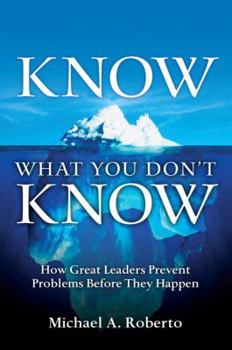Know What You Don't Know: How Great Leaders Prevent Problems Before They Happen
Select Format
Select Condition 
Book Overview
Problems remain hidden in organizations for a number of reasons, including fear, organizational complexity, gatekeepers who insulate leaders from problems that are coming up, and finally, an... This description may be from another edition of this product.
Format:Hardcover
Language:English
ISBN:0131568159
ISBN13:9780131568150
Release Date:February 2009
Publisher:Wharton School Publishing
Length:202 Pages
Weight:1.00 lbs.
Dimensions:9.3" x 0.9" x 6.5"
Customer Reviews
2 ratings
Practical and provocative
Published by Thriftbooks.com User , 16 years ago
Drawing on examples as varied as the 9-11 tragedy and Anne Mulcahy's leadership at Xerox, Roberto explains why leaders need to be not only great problem-solvers but also problem finders. He describes the common reasons why leaders often miss seeing problems until a crisis occurs. He then offers seven practical methods of problem finding that any leader, manager or business owner can apply. An easy, fast and interesting read that will pay real dividends.
"It isn't that they can't see the solution. It's that they can't see the problem."
Published by Thriftbooks.com User , 16 years ago
Michael Roberto cites this especially relevant observation by G.K. Chesterton as a head note to the first chapter of this immensely informative book in which he stresses the importance of mastering seven sets of skills and capabilities that are essential to effective problem-finding. Roberto makes the same key point (among several) in his previously published book, asserting that the most effective leaders are those who "cultivate constructive conflict so as to enhance the level of critical and divergent thinking, while simultaneously building consensus so as to facilitate the timely and efficient implementation of the choices that they make." He goes on to assert that "effective leaders can and should spend time `deciding how to decide.' In short, creating high-quality decision-making processes necessitates a good deal of forethought." Throughout Roberto's lively narrative, there is a strong recurring theme: "leaders must strive for a delicate balance of assertiveness and restraint." In this book, he explains, "I argue that leaders must become hunters who venture out in search of the problems that might lead to disaster" for their organizations. Consider what Peter Drucker observed in an article that appeared in the Harvard Business Review in 1963: "There is surely nothing quite so useless as doing with great efficiency what should not be done at all." The title "Know What You Don't Know" has all manner of critically important implications. Here are three. First, it correctly suggests that identifying and then filling knowledge needs requires the same "level of critical and divergent thinking, while simultaneously building consensus" that the problem-solving process requires. And that consensus should be the result of rigorous scrutiny applied to a number of options even if (especially if) some seem counterintuitive and perhaps even contradictory. Only then will it be possible "to facilitate the timely and efficient implementation" of the choice(s) made. The title also correctly suggests that this process requires high-impact leadership, one that insists on both good will and principled disagreement throughout group discussion and consideration while maintaining "a delicate balance of assertiveness and restraint." High-impact leadership also serves as an example of seven critical skills and capabilities that are needed to ensure that problems do not remain hidden (more about them later), to discover "the bad news that typically does not surface until far too late." However, Roberto adds, becoming an effective problem-finder (a "detective") also requires a "different mindset," one that "begins with a certain level of intellectual curiosity, is based on systematic thinking, and meanwhile realize that "every organization, no matter how successful, has plenty of problems [and they] often lie beneath the surface, hidden from view." This is what Andrew Grove, former Intel chairman and CEO, had in mind when asserting that "only the paranoid survi





